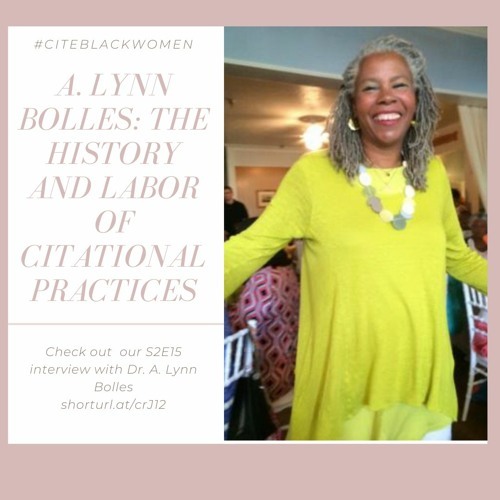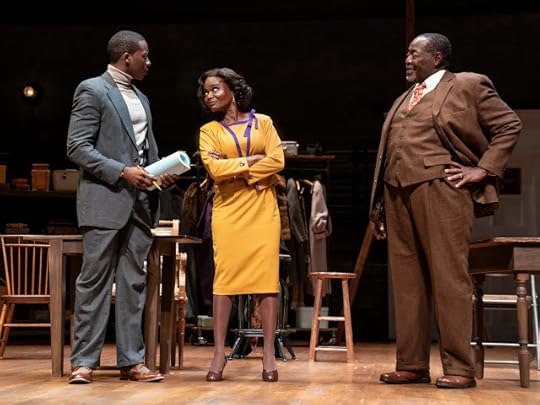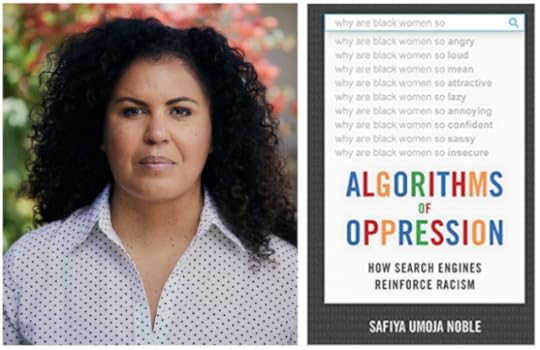Mark Anthony Neal's Blog, page 137
December 6, 2021
72% of Women Who Were Denied an Abortion Ended Up Living in Poverty, Study Finds

'Here & Now's Tonya Mosley speaks with Chabeli Carrazana, a reporter for The 19th, about a study that found 72% of women who were denied access to abortion ended up living in poverty.'
Halle Berry Breaks Down Her Career, from 'X-Men' to 'Bruised'

'Halle Berry takes Vanity Fair through her iconic career, including her roles in 'Living Dolls,' 'Jungle Fever,' 'Introducing Dorothy Dandridge,' 'X-Men,' 'Monster's Ball,' 'Die Another Day,' 'Catwoman,' 'John Wick: Chapter 3 - Parabellum' and 'Bruised.''
Cite Black Women: A Conversation with A. Lynn Bolles on The History and Labor of Citational Practices

'In this episode, Cite Black Women Podcast host interviews Dr. A. Lynn Bolles about her pathfinding work on Black women and the politics of citation in anthropology. A Lynn Bolles, Ph.D. is Professor Emerita in the Department of Women’s Studies and an affiliate faculty member in Anthropology, African American Studies, Comparative Literature and American Studies at the University of Maryland College Park. She is the author/co/author of 5 books that focus on women, work and political economy in the English-speaking Caribbean and the Diaspora and over 80 articles that are interdisciplinary and intersectional.'
Cite Black Women · S2E15: A Conversation with A. Lynn Bolles on The History and Labor of Citational Practices'Black Food' is More than Just Recipes, it's the Stories Behind Them

'Cookbook author and chef Bryant Terry edited and curated the new book, Black Food: Stories, Art, and Recipes From Across The African Diaspora. His goal was to preserve Black American recipes and their complex stories, but he uses more than just food to tell those stories. The book is also full of essays, art and music. Terry told NPR's Book of the Day that the cookbook is a "communal shrine to the shared culinary histories of the African Diaspora".'
A Prescient Play about Race in America has its Long-overdue Broadway Premiere

'Playwright Alice Childress took an unflinching look at racism in society and in the theater with Trouble in Mind in 1955. Now in its overdue Broadway premiere, the play proves prescient and timely. Director Charles Randolph-Wright tells Morning Edition, "Being able to do these words now, these prescient words that she wrote so long ago, it's astounding at how relevant they are right now".'
December 5, 2021
Dr. Safiya Umoja Noble on the Personal Implications of Data Capture

'At The 19th Represents: Building a more equitable internet, Dr. Safiya Umoja Noble, Associate Professor of Gender Studies and African American Studies at UCLA, discusses the biased nature of algorithms and data capture.'
December 4, 2021
2 Kings One Nation: The King of Gospel, Rev. James Cleveland (December 5, 1931 – February 9, 1991) by Johari Jabir

2 Kings One Nation: Happy Birthday to The King of Gospel, Rev. James Cleveland
(December 5, 1931 – February 9, 1991)
by Johari Jabir | NewBlackMan (in Exile)
Rev. James Edward Cleveland was born on December 5, 1931, in Chicago, Illinois, where he was immersed in the “Chicago School of Gospel.” Cleveland made a bridge between the early folk gospel and the more soulful modern gospel of the 1970s and 1980s while never abandoning the musical wisdom of the past. His sound resonated with the Queen of Soul, Aretha Franklin, whom he described as his, “sister,” and Franklin regarded him as her mentor. As seen in the recent tv/movie treatments of Franklin’s life, Cleveland worked as a musician in the early 1950s at Detroit’s New Bethel Baptist Church, pastored by Franklin’s father, Rev. C.L. Franklin. Cleveland returned to Chicago in the mid-1950s, at which time he joined the Caravans, led by Albertina Walker. But it was Cleveland’s return to Detroit in the late 1950s that transformed his musicianship into the modern soul-gospel sound that defines his legacy.
During his second stint in Detroit, Cleveland served as the minister of music at Prayer Tabernacle Church, founded and pastored by Rev. Charles Ashley Craig II. During this period Cleveland was part of a small collective of innovative musicians that included Rev. Charles Craig II, Rev. Leslie Bush, George Jordan, Rev. Charles Nicks, Alfred Bolden, and Herbert “Pee Wee” Pickard, to name a few. The sounds of the blues, folk spirituals, jazz, and gospel were not at all new to Cleveland, but the Detroit gospel collective experimented with slower ballad-tempos, vocal jazz harmonies initiated by Black Barbershop quartets, and they applied a gospel frame to the choral arranged spirituals forged by HBCUs. As a result, Cleveland’s landmark album, “Peace Be Still” reflects the lessons he learned from the “Detroit School of Gospel.”
In 1966, Rev. Dr. Marin Luther King Jr., whom Nina Simone eulogized as, “The King of Love,” and Rev. James Cleveland, named the “King of Gospel,” were together for a Gospel Festival Spectacular hosted by the Civil Rights Activist and “Blues Preacher,” Rev. Clay Evans. Black people’s culture is derived from a capacious cosmology, an expansive and welcoming worldview that holds many kings and queens, several mothers and fathers of movements and music. King and Cleveland were anointed Kings by their people as a way to signify on Black nation time, a nation within a nation not based on homogeneity but filled with dissonance, dissidence, syncopation, riffs, white notes, black notes, blue notes, and breaks. For the current moment in Black study, figures such as Dr. King and Rev. Cleveland should be studied together and not in isolation. Surely, as seen in his partnership with “Queen of Gospel,” Mahalia Jackson, King understood the African proverb; where there is no music the spirit will not come. And, in his legendary use of a “holy hush,” Cleveland was the maestro of using gospel music as a kind of social medicine.
Having set up his headquarters on the West Side of Chicago in the later part of 1965, King didn’t have to travel far to attend the event on the South Side of Chicago, held at Evans’ Fellowship M.B. Church. The Soul Stirrers and the Fellowship Mass Choir were also featured. To date, the music Cleveland rendered on that occasion has yet to be revealed. More than likely Cleveland would have included his signature, “Peace Be Still,” recorded with the Angelic Choir of First Baptist Church of Nutley, New Jersey under the direction of Rev. Lawrence Roberts. The success of the “Peace Be Still,” song and album, marks another one of Cleveland’s critical contributions to Black music: He led the movement to expand smaller groups and choruses into larger gospel choirs.
The image of these two Kings gathered together for a common purpose raises a question; what might the King of Love have thought about the King of Gospel’s rendition of “Peace Be Still?” Dr. King’s passionate anti-war stance left him alienated from most black and white liberals. Neither Cleveland nor the Angelic choir intended to make a gospel anthem on behalf of the Civil Rights movement of the time. Yet, despite these seemingly apolitical intentions, (as if any aspect of Black life could be apolitical in a racist society), “Peace Be Still” captured the very paradox of peace in the modern civil rights era. Through the sonic politics embedded in the song, it asks; how can a people wage peaceful protests in a violent society? A short lesson from what John Michael Spencer calls, “theomusicology” is in order here. “Peace Be Still” reframes the story of Jesus and the disciples recorded in Matthew 8:23-27; Mark 4:35-41; and Luke 8:22-25. In these passages from three of the gospels, Jesus is in the boat with his disciples, who believe him to be unaware of the ragging storm. In its march like tempo, valley-to-mountain crescendos, and in Cleveland’s opening phrase, — Master! the song is both prayerful command and conjure. As such, “Peace Be Still” is a musical exegesis and historical record of Black consciousness.
Several gospel versions of the original hymn, “Master the Tempest is Raging” were circulating on the gospel scene before Cleveland’s version dropped. However, Cleveland’s renamed version, “Peace Be Still,” hit a resonant chord. Musically, the mass choir harmonies and rhythm accompaniment had been woven together in a way that hadn’t been recorded in gospel before. And, in keeping with the social and political roots in Black music, the punctuating soft and loud dynamics between Cleveland and the choir’s powerful response mimicked the social upheaval enabled by the Civil Rights revolution of the 1960s. Cleveland’s vocals provide the details of the storm. By the time the song reaches the chorus, we hear the choir punctuating the phrase, “Peace Be Still,” as if chanting down the soldiers of segregation, as ordered by George Wallace and Strom Thurmond.
The gospel choir in the (ongoing) Black Freedom struggle performs a crucial role in revolution. (every movement should have its gospel choir). When the gospel choir chants, “Peace Be Still,” it is performing a mass act of conjure, one aimed at bringing about God’s perfect peace — over and against imperial peace, which uses war to conquer and kill. Chanting, “Peace Be Still,” is a musical form of non-violent direct action, a channeling of ashe`, the power to make things happen. In the tradition of the “sorrow songs”, chanting “Peace Be Still” is a demand for critical justice, what Du Bois described in the sorrow songs as, “a faith in the ultimate justice of things.” Derrick Bell, one of the early figures in the development of Critical Race Theory says this about the gospel choir,
Gospel, and particularly the gospel choir at its best, echoes
The tempos of the soul searching for God’s peace in the midst
of a hostile world….Truly, this music speaks to the unavoidable
fact that, at bottom, we are all in the same boat….Perhaps gospel
music is the must-sought link that can unite the people of this nation
across barriers of race and color, class and creed, enabling all of
our souls to “ride the air in the songs [we] are singing.”
As heard/seen in Cleveland’s gospel choir, which is rooted in the blues, jubilees, and the sorrow songs, the gospel choir can “make revolution seem irresistible,” to quote the late Toni Cade Bambara. Perhaps, this is what those thousands and thousands of Black people heard when “Peace Be Still” dropped in 1963. The March on Washington on one hand, and the bombing of Sixteenth Avenue Street Church in Alabama that killed Addie Mae Collins, Cynthia Wesley, Carole Robertson, and Carol Denise McNair on the other. Through sonic reflection, the gospel choir reminds us of the holy mystery of humanity, a radical each-otherness the transcends barriers of color, creed, and even belief. The fact that we truly need each other — but cannot say it, is the source of our deepest despair, a pain that feels unspeakable though not inexpressible. And this is the spark ignited when choirs remind us; we are better together than we are apart.
Would that these lyrical fragments, The storm is raging – Peace Be Still, could be but an isolated leitmotif in the repertoire from the King of Gospel. Instead, as Walter Benjamin reminded us, “the tradition of the oppressed teaches us that the ‘state of emergency’ in which we live is not the exception but the rule. We must attain a conception of history that is in keeping with this insight. Then we shall realize that it is our task to bring about a real state of emergency.” (Walter Benjamin, On The Concept of History). When Cleveland passed in 1991 the storm was raging. A significant number of Black churches who once requiredhis songs were aligning themselves with the imperial powers who reject the sacred truth that was the theme of Cleveland’s Gospel Music Workshop of America; “everybody is somebody.” A new Black elite who benefitted from the civil rights movement turned their backs on the Black working class.
Even now, the storm is raging!
The cities are sinking, the waters rising, and fires a ‘blazing. Peace Be Still
A new era of fascism finds the Christian church complicit in violent speech and actions. Peace Be Still.
Millions of people are unfed, millions more are un-housed while just a few collect billions of dollars. Peace Be Still.
Let us, then, mobilize our efforts in the spirit of the gospel choir to bring about the “real state of emergency.” Peace Be Still.
On this, his 90thbirthday, may the memory of Rev. James Cleveland be a blessing to us all.
***
Johari Jabir is Associate Professor of African American Studies at the University of Illinois at Chicago and the author of Conjuring Freedom: Music and Masculinity in the Civil War’s “Gospel Army”
@font-face {font-family:Helvetica; panose-1:0 0 0 0 0 0 0 0 0 0; mso-font-charset:0; mso-generic-font-family:auto; mso-font-pitch:variable; mso-font-signature:-536870145 1342208091 0 0 415 0;}@font-face {font-family:"Cambria Math"; panose-1:2 4 5 3 5 4 6 3 2 4; mso-font-charset:0; mso-generic-font-family:roman; mso-font-pitch:variable; mso-font-signature:3 0 0 0 1 0;}@font-face {font-family:Calibri; panose-1:2 15 5 2 2 2 4 3 2 4; mso-font-charset:0; mso-generic-font-family:swiss; mso-font-pitch:variable; mso-font-signature:-536859905 -1073732485 9 0 511 0;}p.MsoNormal, li.MsoNormal, div.MsoNormal {mso-style-unhide:no; mso-style-qformat:yes; mso-style-parent:""; margin:0in; margin-bottom:.0001pt; mso-pagination:widow-orphan; font-size:12.0pt; font-family:"Calibri",sans-serif; mso-ascii-font-family:Calibri; mso-ascii-theme-font:minor-latin; mso-fareast-font-family:Calibri; mso-fareast-theme-font:minor-latin; mso-hansi-font-family:Calibri; mso-hansi-theme-font:minor-latin; mso-bidi-font-family:"Times New Roman"; mso-bidi-theme-font:minor-bidi;}.MsoChpDefault {mso-style-type:export-only; mso-default-props:yes; font-family:"Calibri",sans-serif; mso-ascii-font-family:Calibri; mso-ascii-theme-font:minor-latin; mso-fareast-font-family:Calibri; mso-fareast-theme-font:minor-latin; mso-hansi-font-family:Calibri; mso-hansi-theme-font:minor-latin; mso-bidi-font-family:"Times New Roman"; mso-bidi-theme-font:minor-bidi;}div.WordSection1 {page:WordSection1;}
Afro-reconstructions in the Caribbean: Aida Esther Bueno-Sarduy

'John Hope Franklin Center at Duke University's Wednesdays at the Center hosted Aida Esther Bueno-Sarduy, an independent filmmaker and an anthropologist at NYU Madrid. At the event, Bueno-Sarduy presented her short "Guillermina", a film based on a true story that reconstructs the memories of the traces left in a 9-year-old child, the son of a well-to-do family in Havana in the 1940s, by his wet-nurse, a black woman named Guillermina. The event was introduced by Miguel Rojas-Sotelo, Director North Carolina Latin American Film Festival.'
Race and Justice: The Philosophy of Charles W. Mills

'A virtual roundtable to honor the life and work of Charles W. Mills, who passed away in September of 2021. Mills was Distinguished Professor of Philosophy at the Graduate Center of the City University of New York (CUNY). He was widely known for his work on social and political philosophy, ethics, and Marxist thought. Mills’ most influential book, The Racial Contract, has had a profound and lasting impact on contemporary thinking about race and justice. Boston Review seeks to honor his life, his work in philosophy and political theory, and most importantly, what he meant for so many. Featuring Joshua Cohen, Derrick Darby, Robert Gooding-Williams, Desmond Jagmohan, Falguni A. Sheth, and Tommy Shelby.'
December 3, 2021
New Film 'Writing with Fire' Spotlights a Women-run News Service Making Waves in India

'Khabar Lahariya, or Waves of News, is India's only women-led news outlet. Since its founding as a newspaper in the northern Indian state of Uttar Pradesh back in 2002, Khabar Lahariya has grown exponentially. Its Youtube channel has nearly half a million subscribers. Now, the women journalists are the focus of the new documentary Writing with Fire, a Hindi-language film that won two awards at this year's Sundance Film Festival.' -- Here & Now
Mark Anthony Neal's Blog
- Mark Anthony Neal's profile
- 30 followers



